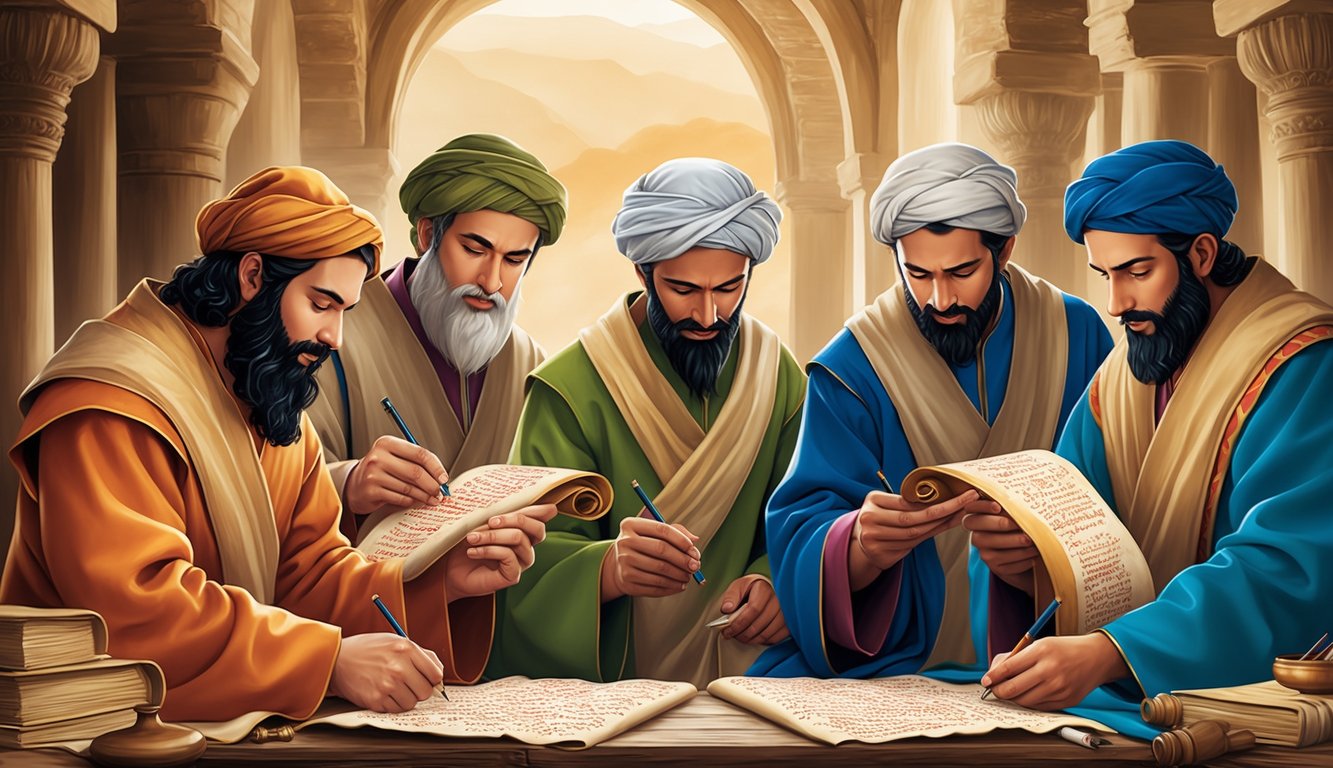Don’t Miss Out On This Unique Astrological Opportunity
Are you tired of spinning your wheels and getting nowhere? Simply put, you’re out of sync: you’re out of alignment with your astral configuration.
But: there’s a kind of map that can help you reclaim your alignment. Think of it as your own personal blueprint to success and happiness: a blueprint that will help you live your most amazing life.
Get started here.
When you open the Bible, you step into a world written by many different authors over hundreds of years.
These writers didn’t all know each other, yet they contributed to a vast tapestry of stories, laws, teachings, and prophecies. Scholars estimate that around 35 to 40 human authors wrote the Bible, inspired by their faith and experiences. Some well-known figures, like Moses and Paul, stand out among the list, but there are many others whose voices blend to form the Scripture you read today.
You’re invited to explore the diversity of the writings and the unique perspectives each author brought.
These texts were inspired and compiled into the Word of God that guides millions worldwide.
The process involved in creating this sacred book wasn’t simple; it spanned different cultures and times, yet it all fits together into a unified message.
As you dive deeper, you’ll discover how different writers contributed unique insights that enrich the Bible’s teachings.
From the laws in the Old Testament to the parables in the New Testament, each author’s work exudes the timeless wisdom and values you find so captivating.
This multitude of perspectives ensures the Bible remains a living document that continues to resonate with people today.
These diverse voices help readers uncover new layers of understanding, making the scriptures relevant to every generation.
For example, exploring the Ezekiel 37 dry bones meaning reveals a powerful message of restoration and hope, showing how God’s spirit can bring life to what was once lifeless.
Such themes of renewal and faith demonstrate why the Bible continues to inspire and guide millions around the world.
Historical Context and Authorship
When exploring the authorship of the Bible, it’s fascinating to see how it reflects a blend of historical influences and diverse traditions.
Each part reveals unique storytelling through its historical context and the varying perspectives of its writers.
Compilation Over Centuries
The Bible is a rich tapestry woven over centuries.
The Hebrew Bible, or Old Testament, developed over hundreds of years, including books like Genesis and Exodus, completed by around the 5th century BCE.
These texts reflect the evolving beliefs and experiences of the Israelite community.
In contrast, the New Testament was written in a shorter timeframe, roughly from 50 to 100 CE.
It includes writings attributed to apostles like Paul and John.
This section captures the early Christian response to the life and teachings of Jesus.
You might be surprised to know that both Testaments were eventually compiled as sacred scripture after years of oral and written traditions.
The process involved many authors, each contributing unique perspectives to this spiritual anthology.
Traditional and Scholarly Views
Traditionally, certain biblical books are linked to well-known figures such as Moses or King David, believed to have composed them.
Many Christians hold that Moses authored the first five books, a belief that shapes the interpretation of these ancient texts.
Scholars, however, often provide a different picture.
They suggest multiple authors across different times contributed to the same texts.
This perspective considers varying writing styles and historical contexts.
For instance, scholars analyze differences in language and themes to understand the Bible’s complex authorship.
You can explore more about this in debates like the Mosaic Authorship Controversy, which questions traditional assumptions about Moses’s role.
Both traditional and scholarly views offer enriching insights into the Bible’s creation and its impact on faith and history.
Books and Their Writers
In this section, you’ll explore who wrote important parts of the Bible.
This includes the first books credited to Moses, writings by King David and others, and the teachings of key figures in early Christianity.
The Torah and Moses
The Torah, also known as the Pentateuch, is traditionally attributed to Moses.
It includes the first five books of the Bible: Genesis, Exodus, Leviticus, Numbers, and Deuteronomy.
Genesis tells the story of creation and the patriarchs.
Moses is a central figure, leading the Israelites out of Egypt and receiving the Ten Commandments.
While some scholars debate Moses’s sole authorship, the works form the foundation of Jewish law and narrative.
Not only are these texts important religiously, but they also contain significant historical traditions.
Writings and Wisdom Literature
Wisdom literature in the Bible includes Psalms, Proverbs, and Ecclesiastes, with King David and his son Solomon often credited as the authors. Psalms is a collection of songs and prayers, many linked to David. Proverbs offers practical life advice, and Ecclesiastes, sometimes attributed to Solomon, explores the meaning of life.
These writings are revered for their poetic form and depth of insight.
The Song of Solomon, or Song of Songs, provides vivid imagery and themes of love.
Together, these books offer an understanding of ancient perspectives on guidance, reflection, and intimacy with God.
Prophets and Prophecies
The prophetic books feature messages from God through chosen individuals. Isaiah, Jeremiah, and Daniel are among the prominent prophets.
Isaiah’s writings include messages of judgement and hope, often predicting the coming of a savior.
Jeremiah’s prophecies speak of exile and restoration for Israel.
Daniel shares visions of future kingdoms and God’s sovereignty.
Prophets conveyed divine messages meant to guide, challenge, and comfort the people of Israel.
Their writings emphasize themes of justice, faithfulness, and redemption, serving as moral and spiritual guidance for future generations.
Gospels and Acts
The Gospels—Matthew, Mark, Luke, and John—tell the story of Jesus Christ’s life, death, and resurrection.
Each offers a unique perspective, focusing on different aspects of his teachings and miracles.
Matthew and John were apostles, while Mark and Luke gathered eyewitness accounts.
The Acts of the Apostles, attributed to Luke, describes the early Christian church’s establishment and growth.
This book details the apostles’ missions and the work of the Holy Spirit among early believers.
The Gospels and Acts provide foundational narratives for understanding Jesus’s impact and the early church.
Epistles and Apostolic Letters
Epistles, or letters, form part of the New Testament, often attributed to apostles like Paul, James, and Peter.
Paul’s letters, such as those to the Romans, Corinthians, and Galatians, offer theological insights and practical advice for believers. James emphasizes faith in action, while Peter encourages perseverance amid persecution.
These letters address doctrinal issues, community problems, and offer encouragement.
They play a crucial role in developing early Christian theology and community life, providing guidance that remains influential in Christian teachings today.
Apocalyptic Literature
Apocalyptic literature uses symbolic language to reveal divine mysteries.
The Book of Revelation, attributed to John, is the most famous example.
It describes visions of the end times, the battle between good and evil, and the ultimate victory of God.
Its vivid imagery and prophetic messages have inspired and challenged readers for centuries.
Revelation reassures believers of God’s plan and sovereignty, despite present difficulties.
These writings often address themes of hope, judgment, and the promise of new creation, which are significant in eschatological studies.
The Process of Writing the Bible

The Bible was shaped over centuries by different individuals and groups performing various roles.
From spoken tales told around fires to carefully crafted written texts, its writing was complex.
Here, you’ll explore key roles, oral traditions, and the eventual editing and compilation.
Roles of Individuals and Groups
Writing the Bible involved many people, each with specific roles. Prophets shared messages claimed to be from God, often writing about their visions. Apostles and disciples recorded the life and teachings of Jesus.
Scribes meticulously documented oral stories and laws. Ezra and Nehemiah played a part in compiling and preserving texts, especially the Law.
Groups of early Christians edited letters and stories into coherent texts for worship and instruction, creating a lasting collection of writings.
This teamwork was essential for the Bible’s formation.
Oral Traditions and Written Accounts
Initially, Bible stories and teachings were passed down orally.
This method involved skilled storytellers sharing events and prophecies.
As time passed, the transition from oral to written forms began.
The stories and laws were carefully written to ensure accuracy.
Moses’s laws and the prophecies of Isaiah were among these.
Written accounts allowed teachings to be widely shared and studied, providing a stable foundation for future generations of believers.
Written records stabilized the oral traditions, preserving them in a way that oral transmission could not.
Editing and Compilation
The assembly of the Bible involved careful editing and compilation, creating the texts known today.
Different letters, stories, and teachings were analyzed and arranged. Editors wanted consistency and clarity, leading to the selection of certain texts while leaving others out.
These processes were not completed instantly.
They took time, with groups of scholars and religious authorities making decisions over the years.
This was vital in forming both the Old and New Testaments.
Choices made by early church leaders determined which books were included, ensuring the Bible’s meaningful and cohesive structure.
The Divine Inspiration of Scripture

When you explore the concept of divine inspiration, it is essential to consider how the Bible’s messages were shaped by a mix of divine influence and human authorship.
Key factors include the role of the Holy Spirit and the relationship between divine wisdom and human understanding.
Concepts of Revelation and Inspiration
In Christianity, revelation refers to the way God communicates with humans.
This includes revealing truths through Scripture.
Many believe these Scriptures were written under divine guidance, ensuring that the messages reflect God’s intentions. Inspiration involves the Holy Spirit guiding the Bible’s authors, making sure their writings convey divine wisdom.
Thus, each book combines divine and human elements.
These inspired texts are viewed as more than just historical or literary works.
They’re seen as a method for God to relay His desires and teachings.
Despite diverse authors, the unified theme of prophecy and revelation stands out.
This unity contributes to the sacredness of the Bible.
Interpreting Messages from God
Understanding how messages from God are represented in the Bible can help you grasp its divine inspiration.
The Holy Spirit is believed to play a key role in interpreting these messages.
Through the Spirit, believers gain insights into God’s will and Jesus Christ’s teachings.
Many Scriptures are seen as God’s direct words.
Prophecies are often highlighted, showing God’s plan for humanity.
These writings bridge the gap between God’s eternal wisdom and human comprehension.
When you read the Bible, it’s suggested you do so with a prayerful heart, seeking guidance from the Holy Spirit.
This practice can deepen your understanding, making the Bible’s inspiration more personal and meaningful.
The Influence and Legacy of Biblical Authors

Biblical authors have left a lasting mark on religion and society.
Their wisdom and teachings continue to shape cultures worldwide.
Impact on Religion and Society
The authors of the Bible have significantly influenced religious beliefs and practices.
Many of their teachings have become central to the Christian faith.
For instance, the Apostle Paul played a pivotal role in spreading Christianity, shaping its doctrines and outreach strategies.
These biblical teachings have also impacted society at large, influencing moral and ethical standards.
The wisdom of the Proverbs and the laws from the Books of Moses have deeply impacted legal systems and ethical codes.
This means that even if you don’t follow a religion, biblical principles can still be seen in various aspects of daily life.
Cultural and Historical Significance
Biblical authors contributed to the cultural and historical framework of ancient societies, especially in Jerusalem.
The narratives of kings and prophets have shaped the traditions and literature of Western culture.
Stories of King David and Solomon, for example, highlight themes of leadership and wisdom.
The temple in Jerusalem is another key element in these writings, symbolizing religious authority and tradition.
This focus has ensured that biblical texts remain relevant in cultural studies, revealing insights into the society and traditions of those times.
Through these writings, you can gain a better understanding of past civilizations and their influence on modern traditions.



